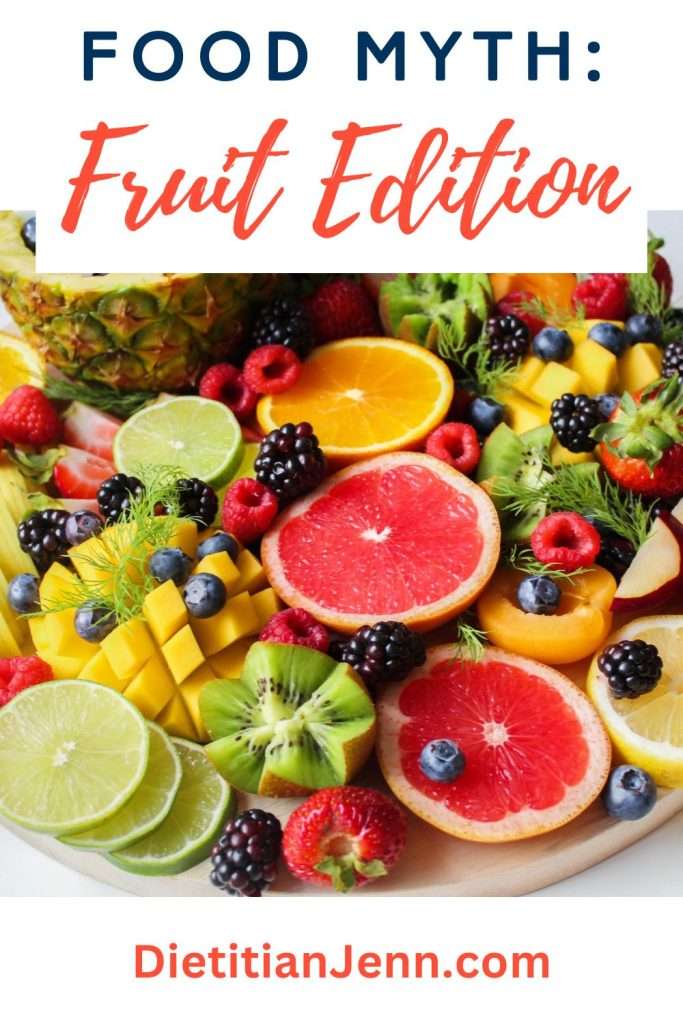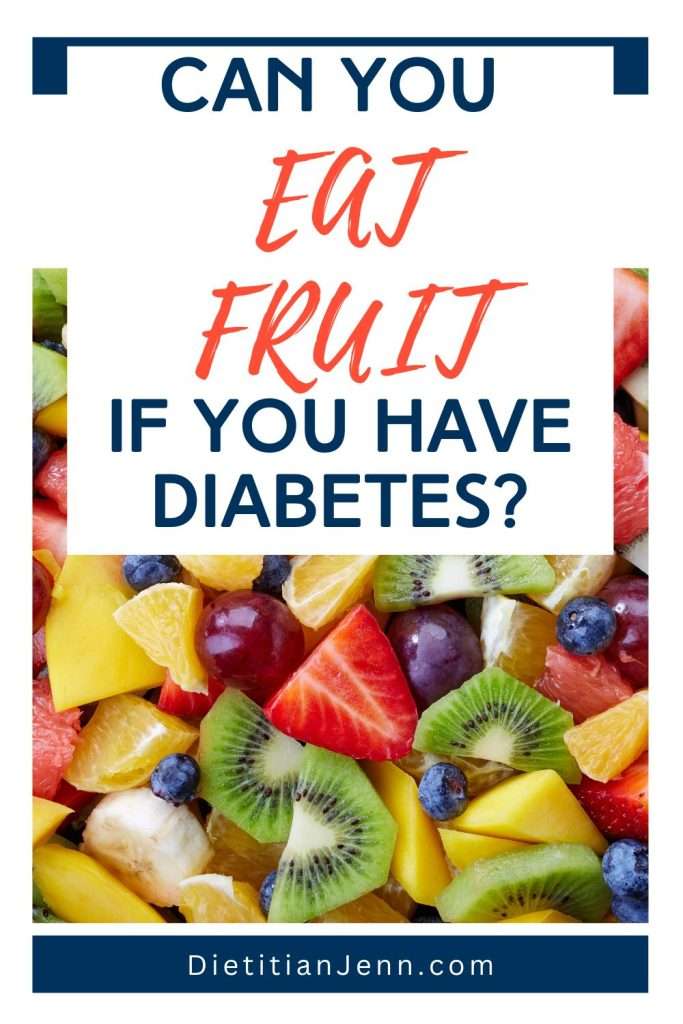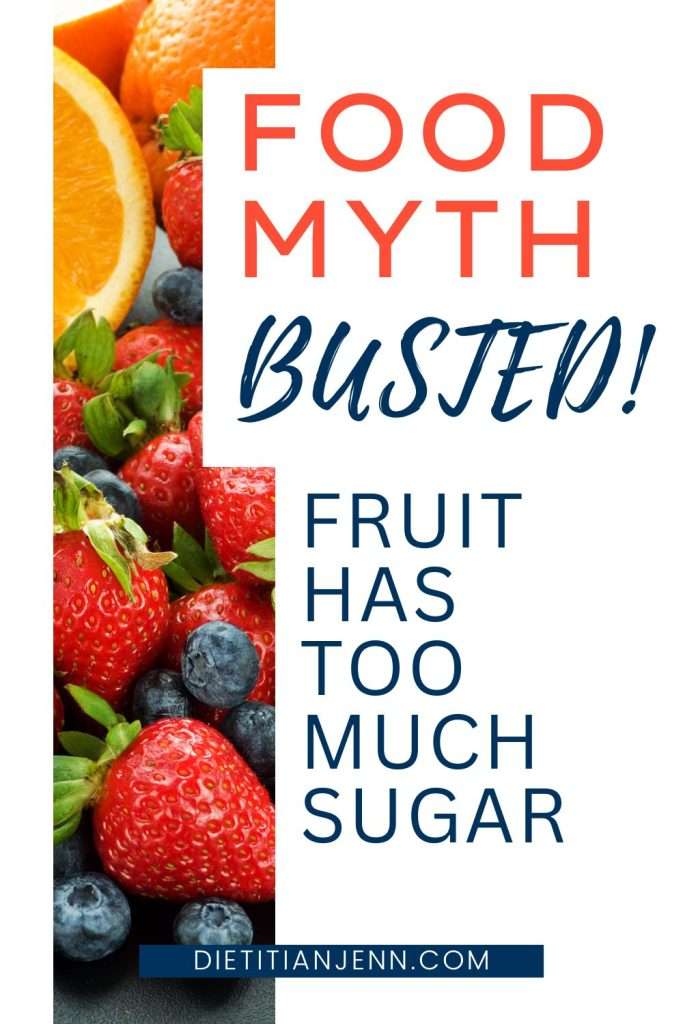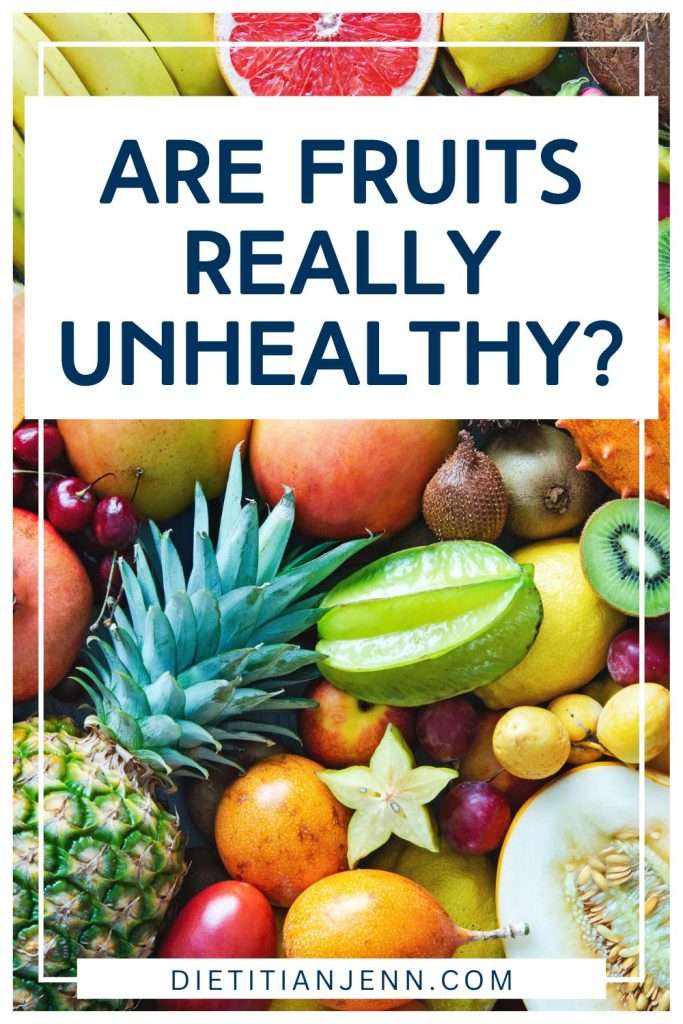Table of Contents
Some links in this article may be affiliate links (disclosure). As an Amazon Associate, I earn from qualifying purchases.
So, today’s myth is one I hear all the time when I’m chatting with patients and clients, especially those dealing with diabetes. I can’t tell you how many people have had their diets dictated to them for months, even years.
Some of the things I’ve heard are just mind-boggling, but the idea that people should avoid fruit (and carrots, of all things) is just plain ridiculous.
And it’s not just limited to diabetes—I’ve seen this advice thrown around for everyone. So, let’s break it down.
Honestly, it’s the kind of thing that makes me want to facepalm and roll my eyes at the same time.
Understanding Sugar in Fruit
People get really mixed up about the sugar in fruit. It’s so easy to just throw all sugars into the same basket, but that’s where the myth begins.
The natural sugars in fruit, called fructose, are a whole different story compared to the added sugars you find in processed foods.
When you eat a piece of fruit, the fiber in it slows down digestion, so the fructose is released gradually into your bloodstream. This means you’re not going to get that sugar rush and crash you often get from refined sugars.
Instead, you get a steady release of energy that keeps you feeling full and satisfied.
And unlike sucrose—which is a combo of glucose and fructose—pure fructose from fruit is absorbed more slowly by your body.
This slower absorption happens because fruit is packed with fiber, water, and other good stuff that helps keep the sugar’s impact on your blood sugar levels in check.
Health benefits of fruit
First off, fruit is packed with fiber. We know that people who get enough fiber each day (that’s 25-30 g for women and 30-38 g for men) have lower rates of heart disease, colon cancer, and even Irritable Bowel Syndrome.
While probiotic supplements can be useful sometimes, their effect is usually temporary. What really matters for your gut health is your diet—especially getting enough fiber.
Basically, fiber feeds the good bugs in your gut, while too much sugar and saturated fat feed the bad bugs.
And then there are phytochemicals. Fruits are loaded with these little compounds that do all sorts of good things for us. We’ve talked about them before (see link), so I won’t go into too much detail here.
But just know that phytochemicals are like nature’s little helpers—they do amazing things for the plant, and then for us when we eat them.
Finally, fruit is also a great source of vitamins and minerals that you might be missing out on otherwise, especially vitamins A & C, folate, and potassium.

So why do people knock on fruit?
This whole issue usually comes from a misunderstanding of what we mean when we talk about sugar.
Here’s the thing: we have a communication problem. When a dietitian or a public health group says you should cut back on sugar, we’re talking about added sugars.
You know, like the ones in soda, cakes, cookies, candy bars, and donuts. These foods are loaded with sucrose or high-fructose corn syrup, which can be tough on your body because fructose is processed differently than other sugars.
What some people hear is, “Eliminate all sugar!”
The truth is, the sugar content in whole fruits, even the fructose, is way lower than what you’d find in desserts and sweets with added sugars. And let’s not forget about that awesome fiber we talked about earlier.
Fiber slows down the glucose spike and how fast fructose hits your liver. So, eating an apple has a totally different effect on your body than scarfing down a cola and potato chips during your afternoon slump.

The Benefits of Including (or Adding) Fruit in Your Diet
A lot of us aren’t getting enough fiber, and that can lead to nutrient deficiencies since fiber-rich foods also come with a bunch of other important nutrients and benefits.
The truth is, most of us aren’t eating enough fruits and vegetables—even vegetarians.
Satiety
A lot of fruits have what’s called high ‘chewing resistance.’ Just think about the difference between chewing an apple and chewing a brownie.
When you chew, it signals your brain to start releasing hormones that tell you you’re full. So, the more you chew, the more satisfied you’ll feel after a snack or meal.
That’s why some people don’t feel as full after drinking a smoothie but feel totally satisfied when they eat those same foods whole.
Vitamins and Minerals
Eating more plants boosts our chances of getting all the vitamins and minerals we need. Folate and magnesium, for example, are pretty common deficiencies here in the U.S.
When we’re not getting enough of these micronutrients, we can end up feeling tired, and our concentration and mood can take a hit.
Common Myths About Fruit
Myth 1: “Fruit is just as bad as candy.”
Remember, candy by itself isn’t necessarily bad. But if you eat too much of it over time, it can definitely take a toll on your health.
When people make comments like this, they’re usually misinformed. They’re not thinking about the vitamins, minerals, fiber, and how filling fruit can be.
It’s a pretty clear sign that they’re repeating something they heard from a ‘wellness influencer’ who doesn’t really understand nutrition science.
Myth 2: “Eating too much fruit leads to weight gain.”
Ugh. Eating too many calories is one of the things that can lead to weight gain. And guess what? There’s nothing different between the calories in fruit and the calories in anything else.
A calorie is just a unit of energy—plain and simple.
But do you know what else can lead to weight gain? Stressing out about your diet, especially when people who don’t know anything about you or your health keep pushing unfounded nutrition ‘advice’ on you.
There’s nothing about fruit itself that’s going to make you gain weight.
Myth 3: “Diabetics should avoid fruit.”
Absolutely not true! Eating fruit can actually help reduce the risk of developing type 2 diabetes.
And if you already have type 2 diabetes, fruit can help make it easier to manage your blood sugar. Improving your gut health can positively impact how your body handles glucose.
Plus, getting enough micronutrients is key. When you’re well-nourished, your metabolism runs more smoothly, which can make managing your blood sugar easier.
If you’re using carbohydrate counting to manage your diabetes, just remember to include the carbs from fruit in your count.
And here’s a quick soapbox moment: Let’s stop referring to people by their diagnosis. They’re not ‘diabetics.’ They’re people with diabetes.
Myth 4: “Fructose is harmful because it can only be metabolized by the liver.”
Even though fructose needs to be processed by the liver, it’s not something to be scared of. It’s just a normal part of how our bodies work, not something inherently harmful.
How much fruit should you eat in a day?
Honestly, the answer can vary depending on who you ask, but generally, it’s between 2 and 4 servings of fruit a day. And you can even go higher if it fits your goals.
I often use this approach with my clients who want to eat more veggies but say they don’t like them. I have them start by eating more fruit and then gradually add in more vegetables.
For someone with diabetes, it’s still important to monitor carbohydrate intake, but adding more fruit usually doesn’t have a big impact on blood glucose levels.
The key is getting used to eating more whole foods, no matter how you approach it.
So what is a serving of Fruit?
A serving of raw fruit is about 1 cup of the edible part—so it’s the fruit without the core and any other inedible bits.
For larger fruit, such as anFor bigger fruits, like an apple, aim for something about the size of a tennis ball.apple, look for something roughly the size of a tennis ball.
Another way to think about it is to make sure that at least half of what you eat each day is made up of fruits and vegetables.

What if you have diabetes?
Check your blood sugar after eating fruit to see how it affects you personally. Just like some people might see a spike in their blood glucose after eating rice but not bread, different fruits can have different effects.
The only way to find out how you respond is to monitor your glucose levels.
Try pairing your fruit with a protein, like a few cubes of cheese or a small handful of nuts.
And remember, it’s always best to ask a dietitian who knows you and your specific needs, rather than relying on generic advice from random websites.

A note on fruit juice, smoothies, and dried fruit
“So many people wonder if their morning orange juice counts towards their daily fruit servings. The answer really depends on who you ask, but I tend to lean towards no, and here’s why.
When you juice a fruit or veggie, you strip away all the fiber. What you’re left with is mostly just the flavor, a few vitamins and minerals, and all the sugar—without the fiber to slow it down.
Plus, many commercial juices have extra sugar added if they contain any real juice at all.
Smoothies are a better option. You blend the whole fruit, so you get all the fiber and nutrients. You can also add protein and a bit of fat (peanut butter, anyone?) to help keep you fuller for longer.
But keep in mind, you might miss out on some of the fullness that comes from chewing. If your smoothie keeps you satisfied, go for it.
But if you’re adding extra sugar and find yourself hungry again soon after, you might want to try something else.
Dried fruit sounds great because you get to chew it and keep the fiber, so what’s the downside?
Well, the water’s removed, which is a big part of what helps you feel full. Imagine how 10 grapes compare to 10 raisins. Which one do you think would fill you up more?

There is no perfect fruit.
Variety is really important for a healthy diet. You’ve probably heard about ‘superfoods’—and blueberries are often on that list.
But if you only ate blueberries, you’d be missing out on all the great stuff in melons, bananas, grapes, and citrus fruits.
The same goes for any healthy food. To get the best nutrition, make sure you’re eating a wide range of fruits and veggies.

How to get your fruit
Add blueberries to your oatmeal or Greek yogurt for a tasty breakfast boost.
When that 3 pm slump hits, grab an ounce of almonds and an orange instead of reaching for chips from the vending machine or a stale donut.
If you’ve got the grill going, toss on some halved peaches or pineapple rings for a delicious treat.
Dip a sliced apple in peanut butter for a satisfying snack.
Watermelon makes a fantastic appetizer when paired with feta cheese and fresh basil. Drizzle a bit of balsamic vinegar reduction on top for extra flavor. I’m actually drooling just thinking about it—and I have all the ingredients ready to go!
Might have to try this tomorrow.
Practical Tips for Multivore Families
Get the kiddos involved in picking out and preparing fruit. Maybe they can wash the apples when you bring them home?
Take everyone’s preferences into account. The best fruit is the one that actually gets eaten, right? There’s no point in bringing home a pineapple if no one wants to cut it up, or buying cherries if nobody likes them.
If just one family member loves a particular fruit, make sure they know it’s available and encourage them to pack it for lunch or have it as a bedtime snack.
And why not use fruit as dessert? You can bake apples, poach pears, or grill watermelon and pineapple slices for a sweet treat.
Final Thoughts
A recent study concluded that we may actually be UNDERestimating the health benefits of fruits and vegetables!
Fruit isn’t just “okay” to eat—it’s crucial for a healthy, balanced diet. Packed with fiber, vitamins, minerals, and powerful antioxidants, fruit offers far more than just natural sweetness.
While getting caught up in the fear of sugar is easy, it’s important to remember that not all sugars are created equal.
So, the next time someone questions whether fruit has too much sugar, you can confidently say that the real myth is avoiding fruit altogether.
Embrace the natural goodness of fruit, enjoy its diverse flavors and textures, and feel good knowing you’re nourishing your body and your family.









Like!! Great article post.Really thank you! Really Cool.
Thanks! I’m glad you liked it.
Let me know if I can help with anything else/